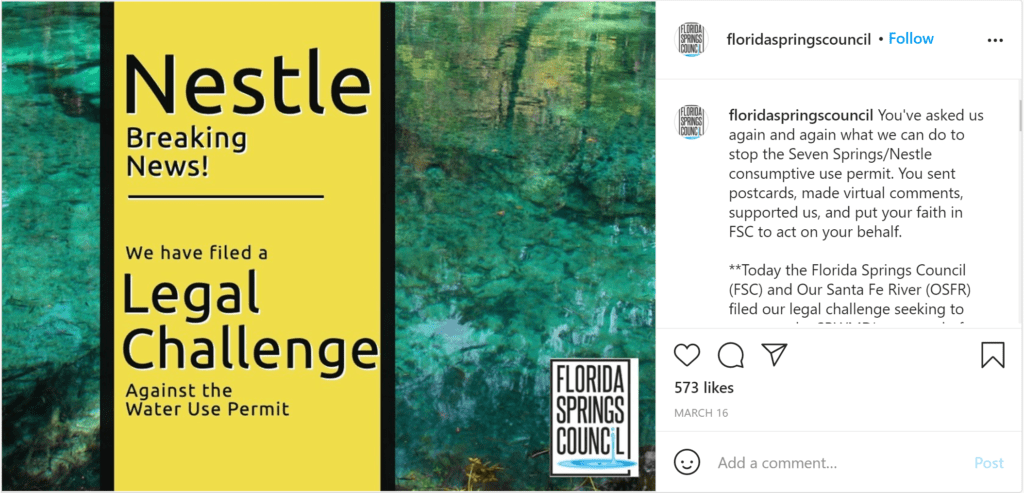Nestle to Deplete Ginnie Springs
Nestle to Deplete Ginnie Springs. Recently, a corporation called Seven Springs Water Co. attempted to renew their water permit allowing them to drain the water from Ginnie Springs to sell to Nestle Waters North America or NWNA. However, this time they wanted to increase the amount of water they drained. The Suwannee River Water Management District stated that the Seven Springs Water Co. did not meet the requirements for the permit and that the amount of water they wanted was a significant increase that the governing board should reject (7). The Suwannee River staff reportedly stated, “the company had not provided them with enough information to show that the increased pumping was in the public interest and that their water plant could handle the boost,” (7).
Seven Springs Water Co. challenged the permit denial and Judge G.W. Chisenhall sided with Seven Springs Water Co. against The Suwannee River Water Management District. Judge Chisenhall stated, “Seven Springs provided competent, substantial, and unrebutted evidence of the contractual obligation between it and Nestle, and of the obligation for all water to be used at the … bottling plant,” (2). Judge Chisenhall also sided with Nestle’s claim that there was enough scientific evidence showing that Seven Springs Water Co. could deplete Ginnie Springs in a sustainable way that would not adversely affect the spring or surrounding wetlands (6). Nestle Waters North America plans to purchase the spring water obtained from Ginnie Springs from Seven Springs Water Co. to sell as bottled water to the public.
Ginnie Springs is a nationally renowned diving area with a rich history. Before the Europeans settled in the area, the Timucuan Indians had a settlement nearby at the Santa Fe River where they ran a stone tool manufacturing operation (3). To this day, divers still find treasures such as arrowheads, flint, and pottery from that historical time. It wasn’t until the mid-1900s that Ginnie Springs became famous for scuba diving. Notorious French Explorer, Jacques Cousteau, visited Ginnie Springs in 1974 and was astonished at the crystal clear water remarking that it was “visibility forever” (4). Many visitors continue to flock to Ginnie Springs to enjoy the cool, clear water.
Environmentalists are concerned that the efforts by Seven Springs Water Co. and NWNA to deplete the springs for profit will have a massive negative effect on the environment. For years, Ginnie Springs and many other springs in Florida were once considered sacred by the Native Americans who originally inhabited the area. The springs were believed to have healing properties according to the Native Americans. To this day, Floridian locals flock to Ginnie Springs with their families to enjoy the refreshing natural springs and explore its cavernous depths.
Once the permit is passed, Seven Springs Water Co. will deplete Ginnie Springs of 1 million gallons of water a day to provide to NWNA (2). Nestle Waters released a statement regarding the use of Ginnie Springs water by saying, “Springwater is a rapidly renewable resource when managed correctly, and Nestlé Waters North America is committed to the highest level of sustainable spring water management at all of the springs we manage – in Florida and across the country,” (5). Nestle seems to believe that the amount of water they purchase will be sustainable and won’t negatively affect the local environment, yet one million gallons of water per day seems to be far from “sustainable”. Many believe that that statement alone is a form of greenwashing or a public relations/marketing scheme to gain public support for corporate greed. Whether or not this is true remains to be seen. The concern is growing over support to deplete the springs and whether that may put other springs in Florida at risk in the future. Unfortunately, we’ll have to wait and find out.

Update: One of the organizations that have recently taken action against Seven Springs Co. and Nestle is the Florida Springs Council. Recently, they posted to their Instagram saying, “Today the Florida Springs Council (FSC) and Our Santa Fe River (OSFR) filed our legal challenge seeking to overturn the SRWMD’s approval of the permit for Seven Springs Water Co. to provide nearly a million gallons of water per day to Nestle’s bottled water operation,” (8). If you would like to help, follow this link to contribute to the FSC’s legal fund.
Sources:
- https://www.floridastateparks.org/parks-and-trails/wekiwa-springs-state-park
- https://www.wuft.org/news/2021/01/22/judge-backs-permit-allowing-water-bottling-near-ginnie-springs/
- https://springseternalproject.org/springs/ginnie-springs/history-ginnie/
- https://www.nationalgeographic.com/adventure/article/dive-freshwater-caves
- https://www.nestle-watersna.com/nestle-water-news/statements/ginnie-springs-florida-seven-springs-permit-renewal
- https://www.gainesville.com/story/news/2021/01/26/nestle-should-get-more-ginnie-springs-aquifer-water-judge-says/4260378001/
- https://www.floridaphoenix.com/2020/04/23/ginnie-springs-and-seven-springs-water-company-profit-ahead-of-the-public-good/
- https://www.instagram.com/p/CMfehPPBFuY/








